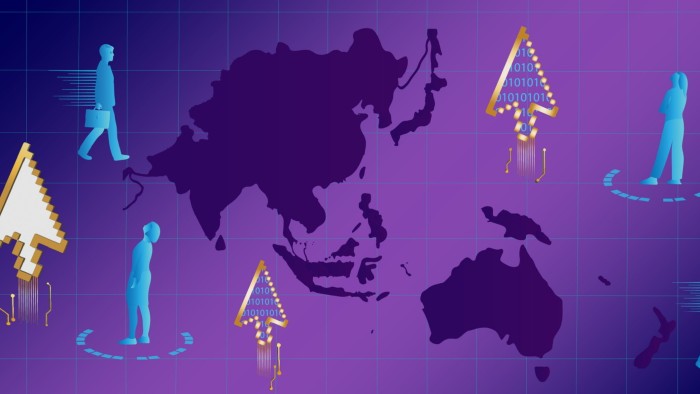Challenge of Asia-Pacific complexity is the spur to its creativity

Roula Khalaf, Editor of the FT, selects her favourite stories in this weekly newsletter.
The Asia-Pacific legal market is smaller, in terms of value, than that of Europe or North America — but, because it incorporates so many differences, working across its jurisdictions is at least as complex for lawyers there as for their peers elsewhere. Just think of the diversity of political systems, languages and business cultures, to start with.
However, the region’s complexity drives innovation. Consider Rajah & Tann’s work for Bayer on the use of drones. The pharmaceutical and chemicals conglomerate uses drones to help farmers in south-east Asia access more accurate and useful weather data.
Farmers use data gathered by drones to help them direct their pesticide spraying more precisely, with related environmental benefits such as healthier soil.
The technology has been trialled in the US, where any data gathered would be covered by a single set of rules and guidelines. In Asia, though, the Rajah & Tann lawyers had to deal with much greater complexity and come up with a data governance system that spanned many different regulations on information protection, languages and legal regimes.
It is just one example of how the legal sector in the Asia-Pacific region has to think more inventively.
Another is how law firm WongPartnership has changed its approach to training. Its bespoke training programme, Learning Journeys, was designed to recruit talented younger lawyers who prize such career development schemes, but it covers every lawyer at the firm, of any age.
They can learn about significant non-legal challenges such as responses on climate change or generative AI. But also in the mix is fostering a better sense of mental health. Rosabel Ng, a fintech partner who leads the programme, says: “We used to focus purely on business skills but I wanted to change the focus to empathy.”
International law firms find the region a good testing ground and launch pad for new ideas, business models and practices. For example, Scott Neilson, a Tokyo-based banking partner at international firm Allen & Overy, is driving the expansion of its energy transition practice. He partnered with an energy think-tank to assess the kind of financing that companies and governments will need to meet their net zero commitments.
Similarly, in-house teams at global businesses increasingly try out their latest innovations in the region. US healthcare company Johnson & Johnson’s global legal team developed a risk management tool in Asia-Pacific first, in part because it felt those lawyers would be more receptive to innovation than others in the US.
In some Asia-Pacific jurisdictions, particularly Australia, law firms and in-house legal teams can often be ahead of the global legal market in their approach to innovation. For example, law firm Gilbert + Tobin set up a “futures board” — a panel of a dozen or so younger partners with leadership potential to bring them into decision-making alongside the main board. And the in-house legal team at Telstra set out to formally adopt management techniques that emphasise collaboration, iteration and speed to transform their everyday working practices. Such developments are emerging against a backdrop of US-China trade tensions, the impact of the 2021 Myanmar coup, and other geopolitical rumblings. Yet most lawyers are optimistic about the Asia-Pacific economy, overall. Many see the geopolitical situation as an opportunity to take the lead in advising clients on how best to restructure and future-proof their businesses.
Connie Heng, regional managing partner at Clifford Chance, says: “We can help [clients] review or ringfence their operations in China, but we can also help Chinese companies navigate sanctions and export controls as they invest overseas.”
More on FT.com: Best practice case studies
Read the FT Innovative Lawyers Asia-Pacific ‘Best practice case studies’, which showcase the standout innovations made for and by people working in the legal sector:
In March, the Indian government saw the trend for some multinational businesses to move their supply chains from China as a spur to take a step towards liberalising its legal market. Yet the announcement from the Bar Council of India, when it came, was still a shock to both Indian and foreign law firms alike.
The two top-ranked law firms in the 2023 FT Innovative Lawyers report (see the FT index below) are Corrs Chambers Westgarth in Australia for Asia-Pacific headquartered firms, and Clifford Chance, among the international firms. Both have embraced digital delivery and made extensive moves to change how they collect and analyse their data and work with clients.
At Corrs Chambers Westgarth, under chief executive Gavin MacLaren, revenues have doubled over the past four years while partner headcount has only grown 20 per cent.
MacLaren puts this growth in efficiency down to “teamwork, collaboration, client engagement, the simplification of processes and the success of significant lateral hires”. In addition, the firm’s business professionals — who are not lawyers — are empowered to operate in leadership roles without interference from partners.
Given Corrs Chambers Westgarth’s relatively small size, with revenues at nearly A$500mn, he feels the firm must be “fast followers” of technology to service clients, rather than creating proprietorial tools.
Clifford Chance, with $2.7bn turnover globally, has more resources to devote to developing business solutions itself. But it, too, has benefited from encouraging non-legal professionals to lead its digital transformation.
Andrew Beasley, head of innovation and best delivery in the region, and one of the “new legal professionals” celebrated in this report, has automated the way lawyers fill in time sheets to achieve greater efficiency and better allocation of work among associates.
He enjoys the opportunities the region offers for experimenting, and comments that he and his colleagues have “unlocked a really effective way of driving change in the business through partner-led steering groups where everyone’s opinions are heard, including those of trainees”.
Methodology
FT Innovative Lawyers Asia-Pacific 2023 is a ranking, report and awards scheme for lawyers based in the region, produced by the FT and its research partner, RSGI, based on a unique methodology.
Law firms and in-house legal teams are invited to make submissions. Each submission is researched and scored out of 10 for originality, leadership and impact, giving a maximum score of 30 for each published entry. Top-ranked entries in the report are shortlisted for the FT Innovative Lawyers Asia-Pacific 2023 Awards.
Some 305 submissions and nominations were received from 64 law firms and 60 in-house legal teams. RSGI researchers assessed and researched them through interviews with clients, senior lawyers, executives and experts between February and April 2023. Featured entries are the highest ranked submissions in each category.
FT law firm index
The index (above) provides a ranking and a holistic assessment of law firm success. Participating firms were assessed on submissions to the report and a separate questionnaire and ranked on the following criteria, with a maximum score of 100:
Innovation
The sum of scores for the top two submissions to the FT Innovative Lawyers Report in Asia Pacific 2023, including submissions that were not published, plus a bonus score for each winning entry (weighted score out of 50);
Digital
Law firms completed a questionnaire on their use of data and technology. Each of five questions was scored and benchmarked against other responses (score out of 25);
People
Law firms completed a questionnaire about initiatives to improve diversity and inclusion, wellbeing and opportunities for business services professionals. Three questions were scored and benchmarked against other law firm responses (score out of 15);
Social responsibility
Law firms completed a questionnaire on their approach to social responsibility. Two questions covering commitment and investment to pro bono work, and social responsibility and ESG reporting were scored and benchmarked against other law firm responses (score out of 10);
RSGI research team
Reena SenGupta; Yasmin Lambert; Mary Ormerod; Tom Saunders; Chris Sharp; Sarah Davis.

Comments